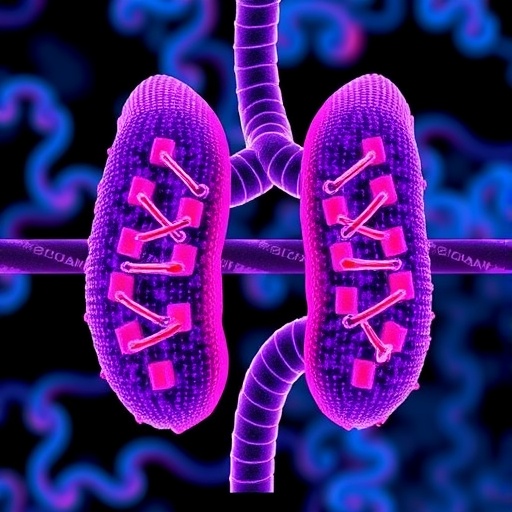In the intricate world of human genetics, the legacy passed down through our DNA intricately shapes not only visible traits such as eye color and stature but also predisposes us to a spectrum of diseases. Among these, cancer remains one of the most complex and feared, often linked to specific genetic alterations. While genes like BRCA1 and TP53 have long dominated medical discourse due to their association with hereditary cancer predispositions, the vast majority of genetic variants remain enigmatic. Termed “variants of uncertain significance” (VUS), these mutations present a formidable challenge for clinicians and genetic counselors striving to interpret individual cancer risks and tailor preventive strategies.
A pioneering study emerging from the laboratory of Dr. Jacob Kitzman at the University of Michigan Medical School sheds new light on this challenging landscape by focusing on the gene MUTYH—a crucial player in the maintenance of DNA integrity. MUTYH’s normal role involves the repair of oxidative DNA damage, a continuous threat to cellular genomes. Mutations in this gene compromise its repair ability and are implicated in the development of abnormal cellular growths, particularly polyps within the colon, which can progress to lethal colorectal cancer. Notably, risk variants in MUTYH are relatively common, with approximately 2% of the U.S. population carrying mutations that may elevate cancer susceptibility.
The study’s core innovation lies in its comprehensive functional interrogation of nearly every conceivable mutation in MUTYH. Traditional approaches to characterizing gene variants often involve painstakingly constructing individual cellular or animal models, each harboring a single mutation. This method, while informative, is labor-intensive and limits throughput. Instead, Kitzman and colleagues constructed a vast mutational library encompassing over 10,900 distinct MUTYH variants, representing an unprecedented saturation assessment of genetic changes within the gene.
.adsslot_JQtObI8AVE{ width:728px !important; height:90px !important; }
@media (max-width:1199px) { .adsslot_JQtObI8AVE{ width:468px !important; height:60px !important; } }
@media (max-width:767px) { .adsslot_JQtObI8AVE{ width:320px !important; height:50px !important; } }
ADVERTISEMENT
To determine the functional consequences of these numerous mutations, the research team developed a sophisticated DNA-repair reporter system. This cellular assay acts as a molecular sensor: cells harboring functional MUTYH produce a fluorescent signal upon repairing oxidative DNA damage, illuminating in green. Conversely, dysfunctional mutations abrogate the repair process, leading to an absence of fluorescence. This binary readout enabled the high-throughput sorting of millions of cells into categories of fully functional, non-functional, and intermediate MUTYH activity.
The experimental data reveal compelling insights. Nonsense mutations—those introducing premature stop codons—predictably disrupted MUTYH function entirely. Synonymous variants, often called “silent” mutations because they do not alter protein sequence, displayed benign behavior. However, missense variants, which result in amino acid substitutions, painted a more nuanced picture. Many missense mutations induced graded functional impairments, forming a continuum from near-normal activity to severe loss of function. This spectrum suggests that the pathogenic potential of missense variants cannot be generalized and must be individually assessed.
Such detailed functional annotation of MUTYH variants bridges a critical gap between genetic testing and clinical interpretation. By comparing their results with the ClinVar repository—a curated database where clinicians classify the clinical significance of genetic variants—the researchers validated their assay’s accuracy. Strikingly, mutations previously identified in patients corresponded precisely with the functional categories delineated in the laboratory, including variants associated with milder disease phenotypes marked by late-onset polyp formation. This concordance bolsters confidence that the assay could refine clinical decision-making, potentially guiding prophylactic interventions.
The implications of this work extend beyond MUTYH. As genetic screening becomes increasingly routine, the field grapples with a surfeit of VUS across numerous disease-linked genes. Functional assays that systematically map the landscape of variant effects are essential to transform raw genetic data into actionable insights. Dr. Kitzman emphasizes this transition: “We can sequence genomes extensively, but interpreting how these sequences translate into disease risk remains a bottleneck. Tools like ours illuminate the meaning behind genetic letters, empowering prevention and personalized medicine.”
This breakthrough comes at a time when colon cancer remains a leading cause of cancer-related mortality worldwide. While inherited mutations in MUTYH account for only a fraction of cases, identifying carriers of high-risk variants affords the possibility of surveillance, early detection, and preventive measures that could be life-saving. The ability to stratify patients based on the functional impact of their specific mutations may revolutionize genetic counseling and targeted screening programs.
Yet, the journey from bench to bedside necessitates sustained investment in basic research. As Kitzman remarks, real-world benefits depend upon continued funding to unravel the detailed molecular underpinnings of cancer risk. This research exemplifies how marrying cutting-edge genomics with innovative functional assays can provide clarity where uncertainty has prevailed for decades.
In conclusion, the functional saturation mapping of MUTYH mutations sets a new paradigm for genetic variant interpretation in oncology. By illuminating the diverse functional consequences of mutations in a gene critical for DNA repair, Kitzman’s team offers a roadmap for harnessing the vast data generated by modern genomic technologies. Moving forward, the integration of such functional information with patient genetic screening will be instrumental in shifting cancer prevention from hopeful aspiration to precise reality.
Subject of Research: Functional characterization of MUTYH gene variants and their impact on colon cancer risk
Article Title: Saturation mapping of MUTYH variant effects using DNA repair reporters
Web References:
https://doi.org/10.1016/j.ajhg.2025.07.005
References:
Kitzman JO et al. “Saturation mapping of MUTYH variant effects using DNA repair reporters.” The American Journal of Human Genetics, 2025.
Keywords: Human genetics, colon cancer, MUTYH, DNA repair, genetic variants, missense mutations, functional genomics, hereditary cancer risk, cancer prevention, genomic screening
Tags: cancer prevention strategiescancer risk assessmentcolon cancer geneticscolorectal cancer risk factorsDNA integrity maintenancegenetic counseling for cancergenetic variants in cancerhereditary cancer predispositionMUTYH gene mutationsoxidative DNA damage repairpolyps and colon cancervariants of uncertain significance





